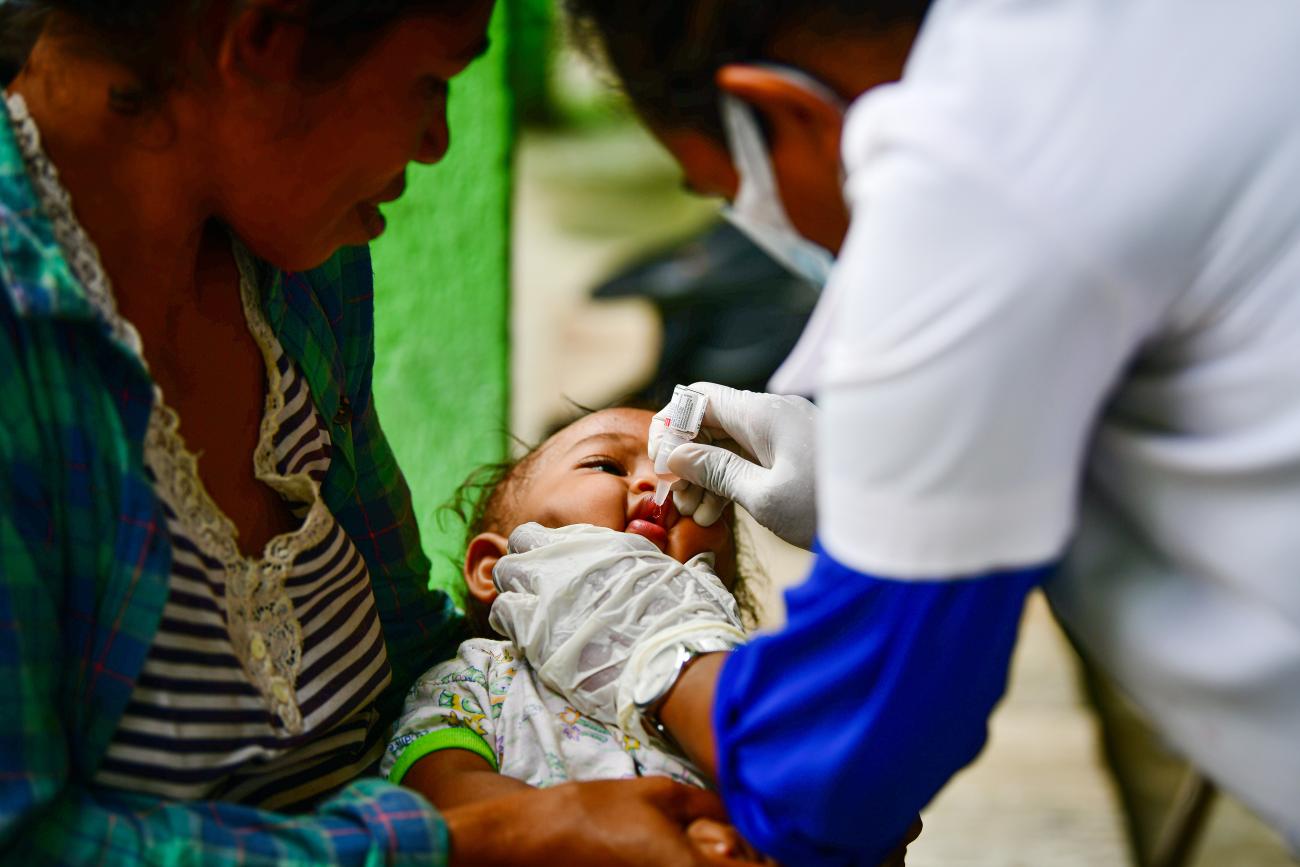Reaching Timor-Leste’s zero-dose children, one household at a time

Three-year-old Natazu Da Cruz lives stone’s throw away from the Lodudu health post in the hilly Ermera region of Timor-Leste.
Yet, when healthcare workers conducting a house-to-house screening reached him, they found that he hadn’t received any routine vaccinations that would protect him from debilitating diseases like polio, measles, hepatitis among others.
Natazu’s parents were unaware that the health post next door, which functions erratically, also substitutes as a vaccination center often. For them, taking Natazu to the Community Health Centre (CHC) a few kilometres away would mean losing out on a workday. But thanks to the team of healthcare workers, Natazu received his first doses of the Oral Polio Vaccine (OPV), Measles and Rubella (MR) vaccine, Pneumococcal vaccine (PCV) and the Pentavalent vaccine providing protection from five life-threatening diseases – Diphtheria, Pertussis, Tetanus, Hepatitis B and Haemophilus influenzae type b (Hib), a few weeks after he was detected as a ‘zero dose’ child.
Armed with the necessary shots in a vaccine carrier, health workers from the Ministry of Health and immunization consultants appointed by the World Health Organization (WHO) traverse difficult terrains to reach communities in remotest parts of Timor-Leste to ensure that children like Natazu are not left behind.

Health workers during a door to door sweeping activity in Suai, Timor-Leste. WHO Photo.
An estimated 8% to 9% children in Timor-Leste are ‘zero dose’, according to an Expanded Program on Immunization (EPI) survey conducted in 2023. While most of these cases are seen in the rural parts, the survey also highlighted a few cases in urban areas. Health care providers say that many of the zero dose children are delivered at home, and thus miss out on the birth doses under the routine immunization. Other reasons for zero dose and dropouts commonly include lack of awareness among parents and lack of willingness to travel to the health care centers, often located several kilometers away. Household visits by health care providers thus become crucial in reaching this population.
“The concentrated efforts by the health care providers on the ground, including the WHO’s immunization consultants have made significant improvements in reaching the zero dose and dropout children,” said Dr Arvind Mathur, WHO Representative to Timor-Leste. “These improvements reflect in the average coverage rate of various antigens in the country compared to the previous years.”
In Timor-Leste, vaccines have successfully eliminated smallpox in the 1980s and polio in the 1990s. The country eliminated maternal and neonatal tetanus in 2012, measles in 2018, and most recently rubella in 2023.

Health workers on the field in Manatuto municipality. WHO Photo/Emilia Moniz
Over the years, numerous immunization campaigns have been conducted as catch up and supplementary immunization drives in the country. In 2015, the country launched a national measles, rubella and polio immunization campaign aiming to reach 500,000 children and committing to achieve over 90 per cent immunization coverage.
The routine immunization programme suffered severe disruptions due to the COVID-19 pandemic. To bridge the gap caused by the disruptions, Timor-Leste, with support from partners like WHO and UNICEF, rolled out an integrated immunization campaign in January 2023. This campaign included essential vaccines such as MR, OPV, PCV, along with Vitamin A supplements, deworming (Albendazole) tablets for children below 5 years, and COVID-19 vaccines for those above 12 years and achieved 95% coverage in a month.
In May 2023, UNICEF and the Government of Australia, signed a $2.7 million agreement to further strengthen EPI in Timor-Leste.
Recognizing the need to strengthen the capabilities of local public health officers, several training sessions were conducted across the country. The sessions focused on enhancing knowledge and skills in immunization practices, vaccine management, data collection and updating them with latest immunization strategies for actively tracking zero dose children through community engagement. These trainings, led by the WHO consultants and local EPI focal points, also included practical scenarios and hands-on exercises.

A WHO immunization consultant inspects the cold chain. WHO Photo.
“Our understanding about cold chain maintenance, microplanning to reach more households, conducting Rapid Convenience Assessment (RCA), has improved tremendously,” said Domingos Tavares (47), an EPI focal person for the Manufahi municipality of Timor-Leste. “Having the WHO immunization consultant on the ground has helped the field staff to constantly learn and implement the learnings,” he said.
Domingos added that difficult roads, bad infrastructure, and insufficient field staff, continue to pose challenges to the immunization program.






